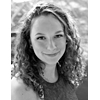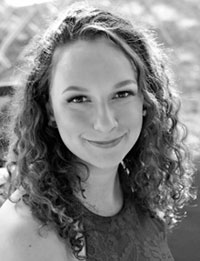AVIVA-Berlin >
Jüdisches Leben > Mia's column
AVIVA-BERLIN.de 4/23/5786 -
Beitrag vom 31.05.2019

Yom HaShoah reflections by Mia Szarvas
Mia Szarvas
There are times we find our voices in the most unexpected of places. Mia Szarvas, a jewish American immigrant to Germany, writes about finding power in a place that memorializes those who were powerless.
The giggles of children filled the air around me. A young boy ran by me, eyes filled with delight. His father followed close behind, chasing his son in a game of tag. Close by, a group of friends in their twenties was taking selfies, laughing. All around me, there were people smiling, joking, having fun. It was a Saturday afternoon in Berlin, the sun was shining, and I was standing in the middle of the Memorial to the Murdered Jews of Europe.
I went there to pay my respects a few days after Yom HaShoah, the day Israel remembers the children, parents, grandparents, colleagues and friends, who were murdered by Nazis just a few decades ago. Since my Jewish family is from Israel, this is the day I pay my respects to my ancestors who were murdered, tortured, or both. I thought about them, and what happened to them, as laughter rose up between the looming cement blocks that comprise the memorial. The smiles on the faces of friends trying to take cool instagram photos painted a sick contrast to the reality I knew this place represented. It reminded me that many Nazis took joy in murdering Jewish babies. I wondered if their joy felt similar to the joy my fellow visitors were feeling now, but I guessed it was probably stronger.
As I made eye contact with a father who was teaching his son that it is proper to play tag in a memorial to six million genocide victims, I wondered who his sonôÇs great-grandfather was. Was he the one who killed my great-auntôÇs best friend, Genya, when she was not even seven years old? My thoughts were interrupted by the little boyôÇs shrieks of joy. He must have been around the same age as Genya when she was deported and murdered.
IôÇd visited this memorial once before, before moving to Germany, and it had upset me so greatly to see people using it as a playground, that I hadnôÇt returned for three years. I was disappointed to see not much had changed in that time. But I had changed.
I felt something welling up inside me. It was overcoming me. My brain repeated the same thoughts, like a mantra. They overwhelmed me, and I was compelled. I knew I was going to speak them aloud.
I marched up to a pair of giggly, selfie-taking teens. In German, I told them I found their actions very disrespectful. I told them this memorial was for my family, who were murdered by the Nazis. I told them how painful it is to hear them laughing in this place. Their faces fell and they looked somber, they apologized and hurried away. I exited slowly, in the opposite direction. It wasnôÇt until after IôÇd walked away, caught my breath, and reflected, that I realized what IôÇd felt overcome me was my own power. I was powerful, and I had a voice.
In the weeks after IôÇd first visited the memorial, three years ago, IôÇd felt terribly. This time was different. I felt good, because I hadnôÇt let the other visitors diminish me. When strangers vandalize a space that is sacred to you with their disrespect, it can make you feel invisible, small, sunken, despairing. This time, IôÇd made myself visible, IôÇd taken my power back from them, IôÇd reclaimed this experience as my own. IôÇd been visible. IôÇd been visible in a place that is dedicated to those who are unseen. By speaking my experience, IôÇd pulled back the curtain, and reminded those girls that they were laughing at a place that represents millions of bodies in unmarked graves, thousands of hours of torture, and countless hearts broken.
By making myself visible, IôÇd made the victims visible again, too. I hoped that perhaps my words would have some small influence, and remind young people that the Holocaust is still real, and painful, for those whose families survived it. I didnôÇt shame the girls, because I donôÇt want them to feel ashamed. I reminded them of the reality of where they were standing, I asked them to take responsibility. I stood in my power and told them to stop. I am going to start making a practice of it.
After exiting the memorial, I looked out over the bleak grey landscape. The cement blocks rose from the earth like tombstones. An anonymous graveyard, too small to fit six million bodies. In my mind, I told the nameless, who once had names, that I saw them, I remembered them, and I would be powerful for them, now.
About: Mia Szarvas was born in Vermont to an Israeli father and Italian-American mother, raised in California, and currently lives in Bremen, Germany. Her grandmother, Marta, escaped from Poland in August of 1939 with her parents and sister, with whom she set up a new life in Palestine, while the family they left behind perished in the Holocaust. Mia has a degree in Political Ecology from the University of California, Berkeley, and works in tech to create empowerment in unexpected places. She is curious about multiculturalism, languages, feminism, and how our intertwined histories inform the present.
Follow MiaôÇs art project "Humans Who Inspire" on Instagram @humanswhoinspire. Mia draws portraits of humans who inspire her as a meditation on the multitude of incredible humans working to make the world a better place. She also accepts requests and submissions.
Read more by Mia Szarvas at AVIVA-Berlin: "I DonôÇt Want Your Shame" - reflections by Mia Szarvas

Photo of Mia Szarvas by Elena Sloman